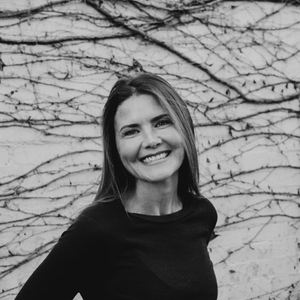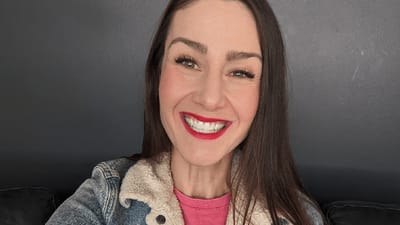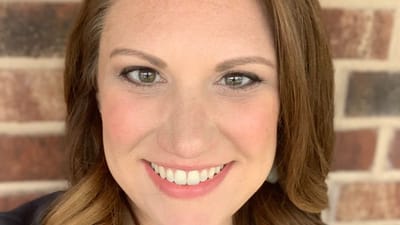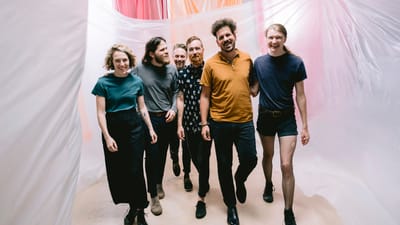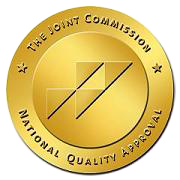Up From "Down Under"
Mental Note is available on Apple Podcasts, Spotify, Stitcher, or wherever you get your podcasts. Search for Mental Note, and subscribe so you never miss an episode!
Check out our podcast, Mental Note. Robyn Cruze teaches us about the co-morbidity between substance use and eating disoders, how coping mechanisms and life passions provide alternatives to destructive behavior.
Robyn Cruze lived an adventurous life to say the least--an actor from an early age, she's chased big dreams, failed in even bigger ways, and not only survived but has discovered a fullness of life she never thought possible. Her journey teaches us about the comorbidity between substance use and eating disorders, how coping mechanisms and life passions provide alternatives to destructive behavior, and that there's no "perfect time" for recovery--the sooner, the better.
Transcript
[00:00:00] [music]
Ellie Pike: I introduced her one time to 100 people in Dallas that, "She's practically my older sister." [chuckles] I have a confession about today's storytelling.
Robyn Cruze: I love that.
Ellie: I don't know if I even said like she hands me down her [unintelligible 00:00:15].
Robyn: I think you did. I think you said that.
Ellie: We might already know each other but that doesn't mean that she doesn't have an incredible recovery story. Robyn Cruze has lived an adventurous life, to say the least. An actor from [00:00:30] an early age, she's chased big dreams, failed in even bigger ways and not only survived but has discovered a fullness of life she never thought possible. Now in recovery, Robyn is a published author, invested mom, and a national recovery advocate living in Denver, Colorado.
Her journey teaches us about the comorbidity between substance use and eating disorders, how coping mechanisms and life passions provide better alternatives to destructive behavior, and that there's no perfect [00:01:00] time for recovery, the sooner the better. Robyn's path to recovery began long ago on the other side of the world with some devastating news about her own mother. You're listening to Mental Note podcast, I'm Ellie Pike.
[music]
Robyn: I grew up on the water with my sister who was seven years my senior, [00:01:30] and then my brother who is very close to me, and my mom and dad. We had a great life. I remember when I was 11 years old, my mom began getting very sick. She was diagnosed with lupus and back then it was just so rare. No one really had heard of this illness or really talked a lot about autoimmune illnesses.
[00:02:00] My mom was told that she was going to die within the year, her kidneys had failed. I just remember my world kind of slowing down and going from this extreme beautiful color to black and white. I started seeing things as they could change and there was no control over life.
Ellie: As Robyn's fundamental outlook crumbled, she discovered an unusual way to cope with all the chaos.
Robyn: [00:02:30] I think that's really where that eating disorder came in because I remember sitting opposite this guy [unintelligible 00:02:42] and I remember having like five packets of potato crisps.
Ellie: Crisps are a British term for potato chips by the way.
Robyn: I was just like throwing them in my mouth and the sensation [00:03:00] of that was so relieving to me, there was a numbness that came over me that made me feel like just for that time that I was eating those potato chips, just for that time, I felt a little numb to the world. I felt like that was my little control into the world.
[music]
[00:03:30]
Ellie: Just to tap-in right there, I remember in your book you mentioned that there was this feeling of being powerful that came along with eating or not eating that created the illusion that you had more control than you really did.
Robyn: Gosh. I don't know what it was but it was the binging because that was really very much of my story, was the binging on food to bring in that slowing down [00:04:00] of the world. It felt like the world was going at 100 miles per hour and so was my internal motor. It was just revving at 100 miles per hour and eating slowed everything down. Then in that eating process was everything was slowed down, I could solve the world, there was hope in that. Those binges was like me putting on a superhero cape and panties, [chuckles] [00:04:30] and I was solving my problems.
Ellie: Could you think more clearly?
Robyn: I could think more clearly and there was, is that everything is slowed down and I could think about how I was going to fix things including myself and how I was going to control myself better.
Ellie: Thankfully Robyn's mom began to stabilize and ended up living for almost 20 more years, however, Robyn's connection [00:05:00] to the eating disorder was already too firm to let go. It quickly moved beyond binge episodes and grew into a collection of disorders.
Robyn: When I started realizing that the food, like the behavior around food was my medication yet if I was taking my medication it was showing on my body. Over time, [00:05:30] there was comments being made, I was a chubby girl. I was a large girl and then I started going to like this show- what's that Mickey Mouse show? M-I-C-K-E-Y M-O-U-S-E Mickey Mouse, Donald Duck, Mickey Mouse.
[laughter]
Robyn: What's that? What's that show?
Ellie: The Mickey Mouse Club?
Robyn: The Mickey Mouse Club. Well, we had our version of that called the Johnny Young Talent Time. [00:06:00] I would go, my mom signed me up and I would go every week and there was these beautiful thin young girls and I realized that I was larger than them. I was just fat in comparison to them and I wanted to look like them. This started me on this journey of having to starve binge cycle, starve binge and I would try [00:06:30] diets and then I would fail and I would binge and I would hate myself because of course, I'm out of control.
Now there's more at stake than just the way I look. I want to be an actress, and that'll make it all better for me. I think if we gave voice to the eating disorder it would be, use me, use these behaviors and you'll get this, while it's secretly robbing you of any possibility of getting it.
Ellie: [00:07:00] The eating disorder would be enticing and manipulative and that's how you got sucked in without recognizing all of the consequences?
Robyn: Yes.
Ellie: Wow.
Robyn: You know I never cared about the medical consequences, I've got to be honest with you. I don't think many of us do when we have an eating disorder. I remember a friend, later on, said to me, "The problem with you, Robyn, is that you're willing to die for it. I'm not." [00:07:30] I would take diet pills and blackout for days. I would take bottles of laxatives and then stop, my bowel would be so compacted that I would be close to a heart attack.
Ellie: That's so scary.
Robyn: Right. My doctor told me that and all I can think about is what he was going to give me in order for me to lose [00:08:00] weight.
Ellie: It seems like it's almost comparable to like being strung out on drugs, it's very comparable.
Robyn: I don't talk a lot about binge eating but I think that that's a very eating disorder that is so associated with the concept of addiction. You hear a lot of people talk about food addiction, you hear all the people talk about compulsive overeating and it's the same mentality of being so addicted to a substance [00:08:30] that the consequences are just secondary.
[music]
Ellie: In the midst of all of this, Robyn continued to grow up and pursue her ambitions, chief among them, her acting career.
Robyn: Well, actually at 19, I started doing theater, and then a London-based director comes and watches me in the last night of this theater and asked me to audition [00:09:00] for a feature film. I audition for this feature film and I get in it and then I kind of starts me on this rollercoaster of auditioning and I finally get a TV show that I'm in, and I end up doing 56 episodes.
Ellie: Back then Robyn believed that in order to advance in her career, she needed to control her weight and find a different relationship with food. She tried making sweeping [00:09:30] changes but never really addressed the root of her actions.
Robyn: The emotions was too much. I started finding ways to medicate and so I started drinking. If I put down the food within a month, bam, I had to start drinking.
Ellie: For you, it felt like- or tell me if I'm correct, do those emotions just feel too overwhelming?
Robyn: Oh, they were. [00:10:00]
Ellie: You kept having to find a way to suppress them.
Robyn: They were going to kill me. The emotions were so overwhelming.
Ellie: It was grief and trauma and anxiety.
Robyn: And life, like the deepness of it. There was something going on and I was trying to make sense. Writing has always helped me make sense of what my inner conflicts are and my struggles are. I remember writing this very dark poem about, I wish my body [00:10:30] was a piece of clothing that I could just zip off and float away. I remember sharing that with my dad. I was so proud of it because it was so deep.
Ellie: It was your way to actually express those hard emotions.
Robyn: Yes, but I remember him looking down at the floor in the garage, which is where my dad would always stay. You could always find my dad in the garbage, chain-smoking. He was looking down at the floor and he said, [00:11:00] "You know, Rob, that's great, but don't tell anyone. Don't share that with anyone." I was left with that feeling that I was too much, but I wasn't enough. Which is so fascinating--
Ellie: You made yourself vulnerable and then it was shut down.
Robyn: Yes, which has always been my struggle, right? I'm too much but I'm not enough.
[music]
Linda Lewaniak: Some of the similarities between eating disorders [00:11:30] and substance abuse are, first of all, they both have high mortality rates.
Ellie: Linda Lewaniak, Senior Director of clinical operations and substance abuse program at Eating Recovery Center and Insight in Chicago. She's also a friend and co-worker of Robyn's.
Linda Lewaniak: For also long-term illnesses, and then they have high rates of relapse. There's also a moral issue. People say, "Just stop drinking, just stop using. Eat, what's the big deal?"
Ellie: Just eat, just stop, right?
Linda Lewaniak: Right, just- [00:12:00] absolutely. There's a lot of denial and secrecy and shame attached to both of the disorders. The other things that I think are important to talk about is loss of control, that they're also resistant at times to treatment. They continue to use despite negative consequences, or they continue to not eat despite negative consequences.
These consequences are pretty severe, like medical consequences, and also the family and legal and emotional consequences for substance abuse. What's really [00:12:30] fascinating about this eating disorder and the substance abuse comorbidities, it's a triple whammy to me, because it's eating disorders, substance abuse, depression. These illnesses are incredibly debilitating.
The next step is really starting to look at your coping style, what are your coping strategies? Where do you learn different types of things? What's your values? You start to identify those, you start to really develop coping skills so that you can manage cravings urges, [00:13:00] the thoughts that you have about yourself and doing this and some of the things that we can do.
Ellie: For Robyn, the feeling of being too much, but never enough hounded her and she pushed deeper into a cycle of eating disorders and substance use as she tried to outrun her problems. This pattern didn't end for a long time. Instead, it recycled itself.
[music]
Robyn: Let's go to LA. The shame was overwhelming [00:13:30] and so I would remove myself from situations and so I went back to Australia. I'm not good enough so where can I be good enough? Go to London, because London is where all the famous people have studied. Then I went back home to Australia. It wasn't until I went back to LA that I finally hit rock bottom because I was going back to LA because I was going to make it better.
It was five years later. I'd been taking [00:14:00] something to stop my appetite. I don't know what it was, but it was basically a speed, whatever I was taking. I couldn't sleep, I was on the edge all the time and I didn't care. I didn't care because it was going to get me somewhere. I was doing these group sessions and somebody- we were talking about body and I [00:14:30] remember crying. I started crying. It was like I'd opened the floodgates. I became like- like sobbing.
I remember putting my feet up onto the chair and bending over, hunching myself over and holding on to my knees so that you could not see my face. I remember saying to the group, "Don't look at me. Don't look at me." [00:15:00]
[music]
Robyn: I had no control of that. When I had composed myself, oh, God, I was like red and snot was coming out from my nose. It was quite a sight, I'm sure. I remember this guy saying to me, "You know Robyn, I've always felt like I can't touch you, that you're not really available. [00:15:30] Seeing that draws me to you. I feel like I can get to now." It's like you taking a lid off. The first layers of recovery, the behaviors is the lid on a jar. You take off the lid, which is the behaviors, [00:16:00] and then you're left with the jar full of emotions.
Ellie: I imagine that feels scary when you're first doing it.
Robyn: I think that that's the biggest barrier between people in recovery. If you ask people in treatment that say- if they're scared of their feelings, if they're scared that their feelings are going to kill them, not one person won't put up their hand.
Ellie: When you took that lid off, why did you finally go through that jar feelings?
Robyn: [00:16:30] I remember sitting on a bathroom floor and I had just given myself food poisoning from food from a dollar store. I remember sitting there and feeling so hopeless and then I thought of my mom. I remember when she said to me, "Robbie, why can't you just take your medication like I have to for my lupus?" My mom has left me with a legacy of strength, [00:17:00] and her willingness to do whatever she could for her recovery.
Ellie: It wasn't when you took the lid off the jar that all the emotions came flooding because I know that's everyone's fear, right? It's, "Oh, my God, it's going to kill me if I feel everything in that jar."
Robyn: Yes.
Ellie: But you were like, "Let it leak out and feel for just a little bit"?
Robyn: No.
Ellie: [laughs] You would feel it?
Robyn: No, it was like a freight train [00:17:30] coming at you while you're standing in the middle of the railroad tracks.
Ellie: Wow.
Robyn: Oh, for sure. It was like [mimic] It was crazy. Or like when you're in a car and somebody is driving and you're in the passenger seat, and they automatically- [unintelligible 00:17:47] a stop sign and then all of a sudden they put their foot on the gas and then you have backlash because your neck goes back, it's so fast.
Ellie: Those emotions would take you aback?
Robyn: Yes, it was fast and furious. [00:18:00] There's this old saying, "The only way to get to the other side is through it." I wanted to get through it. I was so tired of trying to push it away, the emotions, because here's the thing, it's not like there's just one jar of emotions when you get into recovery. It's like, you've got a brewery. [00:18:30] You've got like-
Ellie: A whole factory of jars.
Robyn: - a whole factory of jars. The more you are in the behavior, and the more you're hiding from them, the more jars accumulate. [chuckles] It's not just that one.
Ellie: You felt like you had built up emotion throughout your life that then you wanted to experience?
Robyn: Yes. Listen, I've been expecting my mom to die since I was 11 years old. I'm 29 at this point, and she has not passed. [00:19:00] I'm waiting for the shoe to drop. I have crapped on so many beautiful experiences. I have traveled the world full of self-hate and fear and disgust to myself. I have just annihilated life at this point. There is a ton [00:19:30] of guilt and shame and remorse and low self-worth, even self-hate. There was moments where all I wanted to do is just punch my own face. I was disgusted. That's a lot of jars of grossness to open.
Ellie: What made you do it? [00:20:00]
Robyn: I didn't want the life that I was living. I wanted to find out what was on the other side.
Ellie: What did you hope would be there?
Robyn: Peace, stillness, a little joy here and there, but I knew that because I could deal with the life that I was living now, [00:20:30] like in the eating disorder, I knew I could definitely deal with the life that would be of recovery.
Ellie: That's a lot of strength.
Robyn: Yes, I'm strong, we all are.
[music]
Ellie: With this newfound boldness to face her inner landscape, [00:21:00] Robyn found freedom to move forward in life. She got married, decided to leave her acting career, and start a family. Yet her recovery road still had some twists before she found consistent peace.
Robyn: When I got the phone call that my mom had finally passed, she's on life support. The lupus had attacked her lungs and she couldn't come off and [00:21:30] we had to take her off life support. I'd gone over there but I was 32-weeks pregnant. I had to fly back home in order to have my daughter. I came back and I remember the morning so well where they took her off life support. [00:22:00] I was so pregnant. It was about 6:00 o'clock in the morning.
Tim and I bolted up in our bed at the exact same time and said, "What was that." There was this energy through the house. It was like a wind. Then I got a phone call probably about 10 minutes after that had happened. My brother said, "Bob," he calls me Bob, "Bob, [00:22:30] we're taking off the life support." I said, "Okay." I promised myself that I wouldn't feel the grief because my child needed not to feel that grief. When I got the call that night that she had passed, I remembers screaming.
Then I said yes, [00:23:00] that's enough. That's enough until Lily is born. My husband's an interventionist. When Lily was born, he had to go to New York for eight weeks. Here I am with a brand new baby and the most overwhelming grief. I mean, if you thought recovery was tough, [00:23:30] that's some heavy stuff right there. I had this child. I'm a mom. My mom's not here, and I [unintelligible 00:23:41].
I am desperately depressed, desperately, and my husband is not here, my support, my man, my person, is not here with me. We decided to move to this tiny [00:24:00] little town. Tiny little town called Carbondale in Colorado, from LA. I love the water. I love the sunshine. I hate the cold, and I moved to Colorado in this tiny little cow town. Holy crap, I can't believe I did that.
I did that because I wanted to start drinking again and I couldn't do it because all my friends and all my family there knew who I was. [00:24:30] They knew I went to daily meetings. I had a tribe so large, so large that we'd have open houses every Sunday and all our friends would come over. I couldn't drink with them looking over my shoulder, so I went to this little cow town, convinced my husband that that was the move for us.
I think probably about two months later I pick up [00:25:00] a bottle and I drink. I drink the depression away. Then Tim, he's an interventionist, so he's like, no. Once again I find myself in fetal position. I have two children at this time because they're only 16 months apart or 18 months apart. My [00:25:30] second child is crawling around and my first child is looking over me asking her dad if mummy needs a Band-Aid because I can't get off the floor.
I don't want my children to see that. Tim was like, "Honey I don't think you can do this by yourself," so I go to treatment. I go to treatment. It was the best thing that ever happened. [00:26:00]
[music]
Robyn: Recovery doesn't protect you from hard feelings. They just teach you how to deal with them, but no one gets away from them, like no one. Whether you have an eating disorder or not, no one gets away from feeling life's burdens sometimes because sometimes I think life is just about us learning [00:26:30] lessons and grabbing joy where we find it.
Ellie: Where do you find it?
Robyn: In my kids, in my girls, in writing. I stopped writing for a really long time because I always had excuses. My grammar sucked. I wasn't good at it. [00:27:00] Then one day I was like, who cares if you're not good at it. That's no reason to not write.
Ellie: Tackling those difficult emotions began to pay off. Robyn's family life is now thriving and she has two published books with another currently in the works.
Robyn: Getting recovery is- it felt so out there, like the sky, [00:27:30] like you think you can grab it but you can't. In actual fact it's so far away you can't grab it. I went to get it and just snatch it up.
Ellie: To attain it?
Robyn: Yes, I thought that it was like something that I paid for and I got it, but I didn't realize that there's really no such thing as a destination recovery. [00:28:00] Does that make sense? Recovery is about owning who you are. It's about owning your flaws. It's about putting yourself first even if you feel unworthy. It's about contrary action. It's about being willing to feel the feelings, the messiness of life because when you feel the messiness, it's also the deep, deep rich beauty.
Child 1: [00:28:30] Are you looking at me?
[laughter]
Child 2: Yes, I am.
Robyn: I can tell you right now that my messiness in life is not to ever be pitied because I have found beauty in each of those moments, especially looking back. My messiness is what has created who I am today and I'm proud of who I am today.
Child 2: I'm spending time with the microphone wisely [00:29:00] now.
Ellie: You gave up acting. You've moved all across the world. You did years and years of working towards recovery and dealing with depression and grief.
Robyn: Yes.
Ellie: Why is recovery worth it and life worth living now?
Robyn: I think that life is so worth living because it's fascinating. I get to wake up [00:29:30] instead of demanding what I think the day should be, I get to watch it reveal itself to me. There's such magicness in that. Anybody trying to take on the recovery journey is as strong as I am. You never have to get as sick as I got, and you might be sicker than I got, but you don't have to go down to the basement [00:30:00] to get recovery. You can stop at the second level or the first, you don't have to go all the way down, you just have to start with a willingness.
Ellie: I can't reiterate enough what Robyn said. You don't have to go to the basement to find recovery, you can stop the destruction earlier, even if your situation involves substance use, eating disorders, or other hurdles. Do you remember her story of the jars? Those things don't go away and the fewer you stock up [00:30:30] before going through them, the more quickly you'll get back to the business of living.
For Robyn, her love of connection, writing, and the example her mom set for how to tackle an illness helped Robyn find an alternative life of recovery. What would make recovery worthwhile for you or your loved one? We would love to hear from you. You can contact us at mentalnotepodcast.com. While you're there, go ahead and sign up for our email newsletter and check out our past episodes. [00:31:00]
[music]
Ellie: Mental note is produced by Sam Pike, it's created in collaboration with Eating Recovery Center and Insight Behavioral Health. You can dive deeper into Robyn's story and trust me, there was a lot that I couldn't fit into this episode, by reading her books. Her website is robyncruze.com, R-O-B-Y-N-C-R-U-Z-E .com. As always, if you or someone you know can relate to Robyn's story, please reach out [00:31:30] for a free consultation with a master's level clinician. The phone number is 877-411-9578 or visit eatingrecovery.com. I'm Ellie Pike, until next time.
[music]
[00:32:00]
[00:32:14] [END OF AUDIO]

